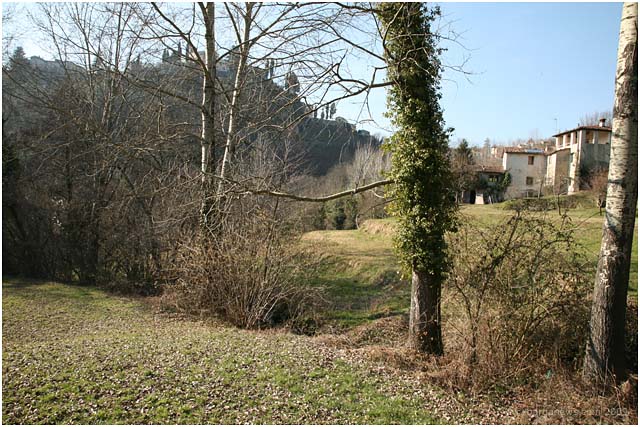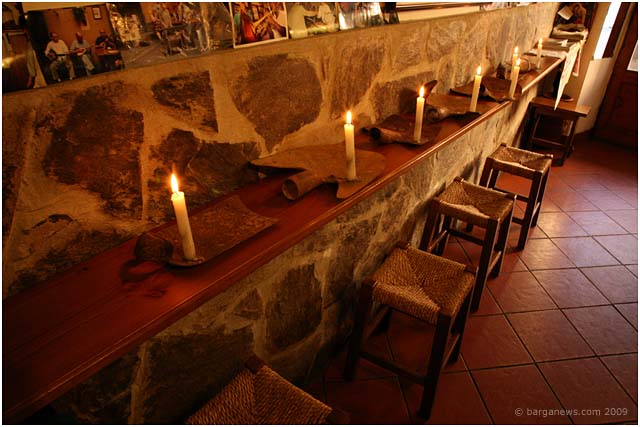Gradually the economic problems besetting world finances and markets starts to make itself felt here in Barga. The “happy island” is not imune after all. Effectively we are all connected up and intertwined – its a world market economy after all. The butterfly flapping its wings in Tokyo* is making itself heard right here in Barga Vecchia. The far extremes of the disposable society where goods are constructed marketed, sold used and then thrown away once broken or a newer model supersedes them has come home to roost. The system has now broken. Whose fault it is is up for discussion but what is clear is that huge shifts in expectations are about to take place. Things are not going to be the same ever again.
no images were found
Home economies are now being made. People are thinking once again about the possibility of repairing, of renovating, of making things last a bit longer. Even thinking about not being some electricity dependent – Pedal power at Aristo’s for Energy Saving Day earlier on this month (article here) where there was already a visual question asked about the future with an installation of spades and candles.
Could it be that professions such as tailors could be making a comeback? We shall wait and see but in the meantime, it’s time to cut out the middleman. Instead of doing a job to earn money to buy food, we are fast approaching the time when the main reason for doing the job will be to produce food, not money.
It is time to get the spade out and start digging. We are talking about a market garden, a vegetable patch – the orto.
Over the next few months we will be documenting the progress, or otherwise, of the barganews vegetable garden as we move from a hazy project on a sheet of paper to fresh vegetables delivered to the kitchen sometime this summer (hopefully)
10th february 2009
So the first thing we have to do is find our piece of land.
It should be fairly easy as we are surrounded by land but upon closer inspection it turns out that a good deal of it has been or is in the process of being built on. Once upon a time they would only build on land that was not good for any other purpose. In other words, land on which food can be grown was not available for building. That is no longer true. The Money God now defines any land as ripe for construction.
There are a number of things which must be satisfied to make the choice of land for our market garden the right choice:
After a couple of weeks of asking around, two possible sites were found and in the end, one probable site was earmarked for the barganews vegetable garden.
Now begins one of the most difficult stages … the negotiations with the owner on just what will be the rent due for the land.
Here in Italy many people are very, very careful about letting people use their land or rent property as sometimes once in procession they can be very difficult to move out. Complicated access laws can mean losing rights after a set number of years making long drawn out and expensive litigation quite often the only means of regaining their property.
Negotiations are under way …. the project is off and running. Watch this space.
*MIT meteorologist Edward Lorenz watched his work become a catch phrase. Lorenz created one of the most beguiling and evocative notions ever to leap from the lab into popular culture: the “butterfly effect,” the concept that small events can have large, widespread consequences. The name stems from Lorenz’s suggestion that a massive storm might have its roots in the faraway flapping of a tiny butterfly’s wings.
Translated into mass culture, the butterfly effect has become a metaphor for the existence of seemingly insignificant moments that alter history and shape destinies. Typically unrecognised at first, they create threads of cause and effect that appear obvious in retrospect, changing the course of a human life or rippling through the global economy.







And yet, merely to highlight the bind we’re all in, maintaining Barganews requires constant infusions of new technology and the chucking of “obsolete equipment” (i.e. more than three years old) that now longer works. This applies to reading Barganews as well, as ever more complex Internet negotiations obligate us to toss out our older computers and buy newer, faster ones.
Can we really break this cycle, and return to older ways of living, eating and communicating that were simpler and now seem more sane, more human? Or is that an illusion layered onto yet a deeper illusion: that the past actually was saner or more bearable. Think, for instance, of what the “simpler” first half of the last century wrought, in the carnage and misery of two world wars. As for the peacetime record of the past, it’s sobering to recall that life expectancy in rural Italy at my birth in 1947 was 48 years for men and slightly higher for women. Today it is above 80.
In the true pre-modern past, before the much maligned Industrial Revolution, only a tiny elite could hope for the satisfactions and comforts that we now take for granted. The lives of the vast majority then, as the great British historian Eric Hobshawn points out, “were poor, nasty, brutish, and short.”
Wow. This is great. You will enjoy discussions how to go organic or what to do with mildew etc 😉 Congratulations! Good luck! There is a french documentary about a similar topic: “Nos enfants nous accuseront”. In France the film came to cinemas only ’cause people watched the trailor online (http://www.nosenfantsnousaccuseront-lefilm.com/) and told their local cinema to show it.
Monacu… I’m not really sure about life expectancy in Europe in general. As far as I remember FAO (Food and Agriculture Organization of UN) expected declining numbers for younger generations (born in 1960s and after… in times of pesticide use in agriculture). It was linked to the increasing number of cancer in children, increasing cancer in adults, and increasing infertility.
Cheers, Kerstin
Not so, Kerstin. You’re a scientist after all — just look up the numbers. The life expectancy figures for Europeans born after 1960 are considerably higher than those before that date. The principal exception is Russia, where (especially among men) mortality soared after the collapse of the Soviet Union.
By the way, infertility has no impact whatsoever on life expectancy, which is measured from birth.
🙂 Okay.
I was wrong for the infertility rate, it influences population decrease, not life expectancy. Life expectancy is an ‘expected’ number, kind of a prediction (it’s not a measure). The calculation of life expectancy is based on probability parameters/values. And these probability numbers again are based (and have to be based) on older data (before the 1950/60s). The parameters depend on many factors, one can include environmental pollution as a factor, or not. I couldn’t find a paper on this… So, I actually have to take it all back and only say: I’m not that convinced, that I’ll have the chance to reach my grandmothers age, or that my life is as healthy as hers.
But anyway, the vegie garden is an awesome idea.
Kerstin
I’m all for the garden too! My cautionary note, rather, was against overly nostalgic views of a past in which life often met Eric Hobshawn’s grim description: “poor, nasty, brutish, and short.”
Far be it from me to nitpick but I have had a horrible day and tomorrow will probably be worse …. but wasn’t it Thomas Hobbes who wrote about “living lives solitary, poor, nasty, brutish and short,” – back in 1651 and wasn’t he talking about the popular view of hunter-gatherers ?
Also you twice mention Eric Hobshawn …. are you in fact referring to Eric Hobsbawm ?
He has already suffered with his name being changed due to a clerical error at birth – altering his surname from Hobsbaum to Hobsbawm … surely once is enough ?
You’re certainly right about my (inexcusably wrong) spelling of the eminent historian’s name, but only half right about the quote. It did indeed appear first in Hobbes’ “Leviathan,” as an observation on the state of mankind at war. Three centuries later, however, Hobsbawm deliberately paraphrased it in his history of the British working class, maintaining that it also applied to most human experience before the modern era — apart from the landed nobility and wealthy merchants.
Sorry I was raising such a fuss about figuring out how to leave a comment! It might help us all if I was able to simply sit down and think a little bit now and again!
Anyway I am reading a very interesting book called “Tilting; House Launching, Slide Hauling, Potato Trenching, and other tales from a Newfoundland Fishing Village” (By Robert Mellin) This book documents the people, architecture, fishery and agriculture of a small village on the Eastern tip of Fogo Island which itself sits 8 miles off the Eastern most coast of Newfoundland. Talk about isolation! The houses in the village which surround the harbor are built with the ultimate fragility, as if they could be plucked away tomorrow leaving no trace at all… The houses were also built on land that was of NO value, reserving of course what little tillable land there was for their gardens… raised bed gardens no less, and located about a 10 minute walk away from the village down closer to a beach where there was a seaweed that was used as a fertilizer. This village was settled by Irish as it turns out, and in fact has one of the oldest all Irish cemeteries in North America.
How this little community was able to survive the long winters on what gardening they could do in the super short summer (along with their fishing of course) is amazing…
One of the things that attracts me so much to Barga and the hills around is the agriculture that is present… so many pieces of property and farms each having small rows of vines, vegetable garden plots and olive and other fruit trees… The contrast to the part of the world I have lived in is amazing… long gone are many of the small family farms of the Maritime Provinces and Northeast States, each of which of course, used to have their own gardens and orchards, as well as animals.
Recently in one little village close by to us our friends were greeted at their front door by the local “Code Enforcement Officer” serving them with news of a complaint lodged about the 12 laying hens that they keep in a roost in their dooryard, which also turned out to be a local code ‘violation’. They are being forced to ‘remove the chickens’. At the same time the nearby city of Portland, has just voted to overturn a ordinance which had for many years NOT allowed chickens within city limits. (only chickens, however… NO roosters!)
So there is slow change around here… but at least the conversations are beginning to be had.
Thanks to the good folks of Barga and the Barganews crew for continuing this conversation about agriculture and sustainability.
Your contentment is justified on the level of self-sustaining gardens, which provide seasonal fruits and vegetables to their owners. But there are virtually no crops grown around Barga for sale. The traditional agricultural economy here revolved almost entirely around chestnuts, and as long ago as the 19th century it was too weak to support more than two children in each farm family (if that). Hence the region’s immense emigration abroad — to the United Kingdom, North and South America, and later Australia. In a lot of ways, alas, the situation in this part of Tuscany closely resembles what you find in Newfoundland.
But Monacu! That is the point! Perhaps it (agriculture) is not supposed to be part of an economy outside of its own area? To do so, suddenly you are into transportation, mono-crops, large farms, economies of scale etc etc. Which may not lead themselves to sustainability.
The model of agriculture around Barga participating in a larger removed economy may not be able to work. But (one could argue) by creating self-sustaining gardens, orchards, and livestock could;
“break this cycle, and return to older ways of living, eating and communicating that were simpler and now seem more sane, more human?”
Once you start this conversation it is easy to slide into the old “well we should just crawl under rocks again like we used to!!”
So the trick is to find the balance between where we ‘first were’ and where we are now?
Brava! (Or is it Bravo?) In any case, I can certainly second your emotion. The trick indeed is to find a way of altering what needs to be altered now, without simply re-embracing old ways that had their own follies and cruelties.
Well…. could we think about working out some details at Aristo’s some time soon??
I’ll buy the first round!
Big spender, huh? Incidentally, Marino has introduced a new “superior” grade of wine — he opens different bottles every evening, some of it quite drinkable — at 1€50. Since the goblets he uses for the superior are thre times the size of the traditional Aristo bistro glass, the actual cost of the wine is less than the (equally traditional”) rotgut. But no one is pointing this out to him…
Yes but do not let a certain career Maitre d’. see him pour any more than the requisite 1Dl, regardless of the size of the glass, or he’ll have some explaining to do… ; )
But does the “superior” vino taste like Bananas like the bistro pour used to? My thumbs have not yet gone back to their normal size after all that wine I drank last winter!! But I like this idea, and can’t wait to be there to try it all out!!!